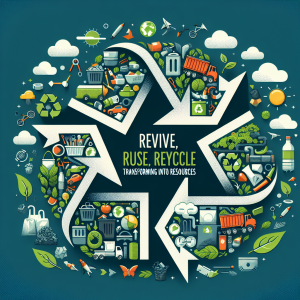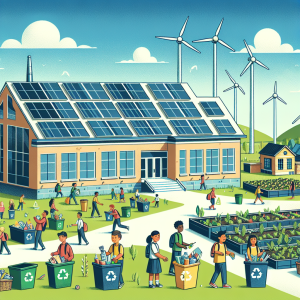The Role of Technology in Modern Recycling Efforts
The role of technology in modern recycling efforts is a transformative force, driving efficiencies and bolstering environmental sustainability. In recent decades, the recycling industry has significantly evolved, largely due to technological advancements. From sophisticated sorting systems to smart waste management tools, technology is pivotal in redefining how materials are collected, sorted, processed, and repurposed.
Modern recycling heavily relies on advanced sorting technology, which is critical in managing the complexity of today’s waste streams. Facilities now employ cutting-edge machines equipped with optical sensors that utilize near-infrared spectroscopy. These sensors swiftly identify and sort materials based on their chemical composition at speeds that human workers could never achieve. Such systems ensure that plastics, metals, paper, and other recyclables are accurately separated, minimizing contamination and increasing the efficacy of the recycling process.
Robotics also play a crucial role in modern recycling efforts. With the advent of AI-powered robots, recycling centers have significantly reduced labor costs and risks associated with manual sorting. These robots, programmed to perform repetitive tasks, can differentiate between various materials with precision. Machine learning algorithms enable them to improve their sorting accuracy over time by analyzing large datasets. Consequently, robotic systems not only expedite the recycling process but also enhance the quality of sorted materials.
Another technological advancement reshaping the recycling landscape is the implementation of smart bins. These innovative waste collection systems are equipped with sensors that monitor fill levels and send alerts when bins are near capacity. Such smart solutions optimize collection routes, reducing fuel consumption and emissions from waste transportation. Additionally, some smart bins come with integrated compactors, effectively increasing the capacity of a single bin and further limiting collection frequency.
The role of technology extends beyond sorting and collection systems. Chemical recycling, an emerging technology, offers a solution to the limitations of traditional mechanical recycling. While mechanical recycling often downgrades materials, chemical recycling processes fundamentally break down plastics into their monomers. This technology enables the production of virgin-quality materials, reducing dependence on raw resources and closing the loop in a truly circular economy.
Blockchain technology, although in its nascent stages within the recycling sector, is poised to enhance transparency and traceability. By creating immutable records of materials from collection to repurposing, blockchain ensures accountability in both environmental claims and supply chains. Stakeholders across the recycling ecosystem, including manufacturers, waste managers, and consumers, can access real-time data on the lifecycle of recyclable materials. Such transparency fosters trust and encourages more responsible consumption and production patterns.
Mobile applications designed for waste management are also making significant headway in promoting recycling efforts. Apps that guide users on how to sort waste properly help minimize contamination at the source. Innovative platforms facilitate exchanges of recyclable materials between individuals and local recycling centers, increasing participation rates and awareness. These applications also integrate gamification elements to encourage recycling habits, rewarding users for environmentally friendly actions.
The Internet of Things (IoT) further enhances recycling efforts by connecting devices and systems, enabling more efficient data collection and analysis. IoT sensors along recycling conveyor belts collect data on material flow rates, contamination levels, and equipment performance. This information allows recycling facilities to optimize operations and maintenance schedules, significantly boosting overall efficiency. Smart city initiatives harness IoT technology to monitor waste generation trends, empowering municipalities to make data-driven decisions on resource allocation and public awareness campaigns.
3D printing technology, although not traditionally associated with recycling, is revolutionizing material repurposing by utilizing waste-derived filaments. This approach creates new market demands for recycled plastics, promoting a sustainable loop where waste becomes a valuable input resource. Manufacturers are increasingly exploring ways to incorporate recycled materials into the 3D printing supply chain, further expanding the applications of recycled products and reducing dependence on new materials.
Despite technological advancements, modern recycling faces critical challenges, most notably in areas of electronic waste (e-waste) management. E-waste, often rich in precious metals, requires specialized technology for efficient processing. Acid-free recycling methods and urban mining technologies recover valuable metals from e-waste while minimizing environmental impact. By investing in research and development for e-waste recycling technologies, the industry can mitigate hazards associated with toxic components and extract maximal value from disposed electronics.
Public policies and incentives play a vital role in supporting technological integration into recycling efforts. Governments worldwide are implementing regulations that encourage investment in recycling technologies, such as grants for innovation in waste management or tax incentives for facilities upgrading their systems. Collaborative efforts between the public and private sectors can further accelerate technological advancements and drive systemic changes in recycling infrastructure.
As the global community becomes more conscious of its environmental footprint, the demand for advanced recycling solutions will continue to rise. To capitalize on these opportunities, ongoing research and development in recycling technologies remain essential. By fostering a culture of innovation, stakeholders can ensure that recycling processes not only meet current demands but are also equipped to tackle future waste challenges effectively. The synergy between technology and recycling holds the key to sustainable growth and environmental stewardship, paving the way for a more resilient and resource-efficient future.



